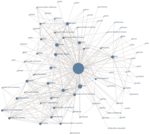Big Borgar ….
Posted in: UncategorizedClick Image To Enlarge
Advertising Agency: Leo Burnett, Cairo, Egypt
Executive Creative Director: Mohamed Hamdalla
Creative Director: Hesham Ellabban
Copywriter: Tameem Youness/Yahya Esmaele
Photographer: Hussein Shaaban
Illustrator: Ahmed Hefnawy
Account Supervisor: Yosr Bayoumy
Via [DubaiLynx]
Have a ‘mini’ break ……
Posted in: UncategorizedClick Images To Enlarge
Advertising Agency: JWT, Dubai, UAE
Executive Creative Director: Chafic Haddad
Art Director: Nizar Swailem
Copywriter: Ash Chagla
Strategic Planner: Prabhakar Iyer
Account Supervisor: Shereen Fotouh / Jayanthi Thiagarajan
Via [AdBasha]
Potted plants from Exotica let you breathe
Posted in: Uncategorized
Click Images To Enlarge
Advertising Agency: Leo Burnett, Lebanon
Creative Directors: Bechara Mouzannar, Chermine Assadian
Art Directors: Manal Naji, Joumana Ibrahim
Copywriters: Amin Kurani, Alex Kent
Illustrator: Mark Calina
Photographer: Jihad Hojeily
We’re all children on Mother’s Day
Posted in: UncategorizedClick Image To Enlarge
Advertising Agency: H&C Leo Burnett, Beirut, Lebanon
Creative Directors: Bechara Mouzannar, Chermine Assadian, Betty Francis
Art Directors: Layla Naamani, Roula Asmar
Illustrator: Mark Calina
Photographer: Mario Kiener
Via [AdsoftheWorld]
Barbie’s Birthday Ride, Defiled Desserts, Neo-Con’s Golden Child
Posted in: UncategorizedDon’t flush more trees down the toilet
Posted in: UncategorizedClick Image To Enlarge
Advertising Agency: DDB, Muscat, Oman
Creative Director: Mahesh Anvekar
Art Director: Pravin Amudan
Copywriter: Santu Sakar
Graphic Designer: Nilesh Ayare
Via [AdsoftheWorld]
Fight isolation, poverty, neglect
Posted in: UncategorizedClick Image To Enlarge
Advertising Agency: Pirana, Dubai, UAE
Creative Directors: Arun Diwakaran, Shehzad Yunus
Art Director / Copywriter: Kiran Chandorkar
Via [AdsoftheWorld]
ATTIK Out With NoiseFive
Posted in: UncategorizedExperience the unusual with VW Scirocco
Posted in: UncategorizedClick Images To Enlarge
Advertising Agency: DDB Gulf
Creative Director / Copywriter: Rishad Lawyer
Art Director: Guilherme Pecego
Photographer: VW data base
Via [AdsoftheWorld]
Forever young, with Dubai Cosmetic Surgery
Posted in: UncategorizedClick Image To Enlarge
Advertising Agency: Memac Ogilvy, Dubai, UAE
Executive Creative Director: Till Hohmann
Creative Directors: Dalbir Singh, Ramzi Moutran
Art Director: Mel Harvey
Copywriter: Dylan Kidson
Photographer: Guy Neveling
Retoucher: Cream Studios, Sydney
Via [AdsoftheWorld]
Use Hansaplast …. and the wound dissappears!
Posted in: UncategorizedClick Image To Enlarge
Advertising Agency: TBWA\RAAD Dubai
Executive Creative Director: Milos Ilic
Art Director & Copywriter: Mohanad Shuraideh
Copywriter: Mohanad Shuraideh
Photographer: Tejal Patni
Illustrator: Ashish Vaze, Rahul Joshi
Via [ mediaME ]
Legs Clamps ‘Net, Old-School Twitterati, Thinky-Thinky Print Pieces
Posted in: Uncategorized
– Creatives on Craigslist. Yeah, it’s sad. But not as sad as disseminating bulky PDFs about creatives on Craigslist.
The person you’re trying to reach is no longer available
Posted in: UncategorizedThere is a key ….
Posted in: UncategorizedClick Image To Enlarge
Ad Agency: Leo Burnett, Beirut, Lebanon
Creative director: Chermine Assadian
Art Directors: Manal Naji
Copyrighter: Alex Kent
Via [ mediaME ]
Carrefour droping, cutting and knocking down prices!
Posted in: UncategorizedHavas Does the Social Graph, Mullen Gets Diabetes, Winformercial Strides
Posted in: UncategorizedOMG! An Agency Won Some Business!
Posted in: UncategorizedConcentrate on the road …..
Posted in: UncategorizedClick Images To Enlarge
Advertising Agency: Memac Ogilvy & Mather, Dubai, UAE
Executive Creative Director: Till Hohmann
Creative Director: Dalbir Singh
Art Director: Satyen Adhikari



































